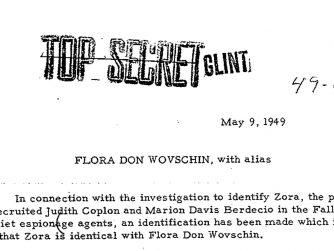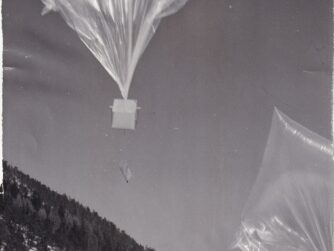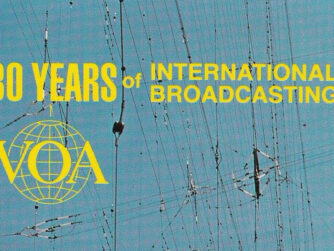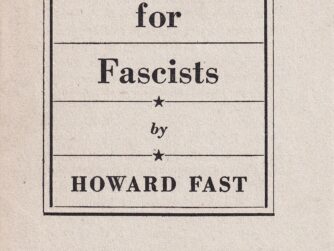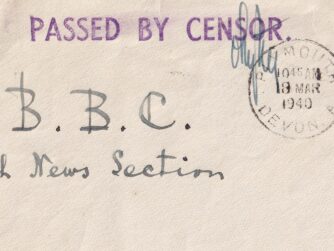Policy Directive to Use Howard Fast’s Book
In his testimony before the Senate subcommittee, Barmine responded to a question about a directive from the agency’s Policy Division to the Voice of America editors to use one of Howard Fast’s bestselling historical novels after the war.
Senator MUNDT. Did you receive the rather famous Washington directive to use the Howard Fast book?
Mr. BARMINE. Yes; we did.
Senator MUNDT. As an old Communist specialist, what do you think about that?
Mr. BARMINE. Well, I could speak for my Branch, as a matter of fact. We received the Howard Fast directive, but in this case, due to these disagreements that happen usually on these kinds of directives, we, I would say, applied broad interpretation.
The CHAIRMAN. In other words, instead of refusing to follow it, you gave it what you would consider a broad interpretation?
Mr. BARMINE. Well, our broad interpretation was the following. For our Russian Branch, I approved two scripts about Howard Fast, and we put them on the air. But those scripts were not quoting Fast as an authority to support our position, but blasting Fast as a traitor and a contemptible liar.
The CHAIRMAN. Do you have any of those scripts with you?
Mr. BARMINE. I may quote one last concluding sentence from one of those scripts, which was broadcast in the Russian news.
Here is the conclusion of our broadcast on Howard Fast:
So long as Fast refrains from committing crimes that are punishable under the law, American authorities visit no punishment on him—no matter how monstrous his lies about America may be—for the very reason that America is a free country. For that matter, what would be the point of punishing Fast? As I stated before, the average American is already punishing him, as he is punishing every slanderer and liar, by having only one feeling for him—contempt.
Senator MUNDT. That is a very good way to interpret the Howard Fast directive.
The CHAIRMAN. Did you have the feeling that the Washington office was trying to impair your effort to put on a real hard-hitting program of anti-Communist counterpropaganda?
Mr. BARMINE. Well. it was rather periodic, from time to time.
The CHAIRMAN. I did not get that.
Mr. BARMINE. It was a chronic disease. It was coming at intervals all the time for several years.1
Houseman’s departure as the chief producer of VOA radio programs in mid-1943 and Fast’s departure in February 1944 made no significant change in the Voice of America’s pro-Soviet and pro-Stalin propaganda. Fast received a glowing recommendation letter from VOA’s next chief, Louis G. Cowan, in which Cowan stressed that Fast’s resignation was completely voluntary and much regretted by the OWI senior leadership. Cowan ended his letter to Howard Fast with a note that he was grateful for his service at the Voice of America, not only on his behalf but also on behalf of Office of War Information Director Elmer Davis, Overseas Bureau directors Robert E. Sherwood and Joseph Barnes, and former VOA Director John Houseman. Many people at the agency “have been inspired by your sincerity and your achievement,” Cowan added.2
The Soviet influence at the Voice of America during World War II was not exposed to any significant degree by Senator McCarthy. It was revealed more fully and without McCarthy and his theatrics by a bipartisan committee of the House of Representatives, which in 1951-1952 investigated the Katyn massacre — the mass murder of thousands of Polish military officers and others who, in 1939-1940, were prisoners of war in the Soviet Union. The Madden Committee, named after its chairman Ray J. Madden (Democrat – Indiana), suggested in its Final Report, released on December 22, 1952, that a clever Soviet manipulation of the U.S. government was responsible for critical and tragic mistakes in American foreign policy and U.S. information programs.
In submitting this final report to the House of Representatives, this committee has come to the conclusion that in those fateful days nearing the end of the Second World War there unfortunately existed in high governmental and military circles a strange psychosis that military necessity required the sacrifice of loyal allies and our own principles in order to keep Soviet Russia from making a separate peace with the Nazis.3
The committee added:
For reasons less clear to this committee, this psychosis continued even after the conclusion of the war. Most of the witnesses testified that had they known then what they now know about Soviet Russia, they probably would not have pursued the course they did. It is undoubtedly true that hindsight is much easier to follow than foresight, but it is equally true that much of the material which this committee unearthed was or could have been available to those responsible for our foreign policy as early as 1942.4
The Madden Committee also said in its Final Report in 1952:
This committee believes that if the Voice of America is to justify its existence, it must utilize material made available more forcefully and effectively.5
Members of Congress criticized the Office of War Information Director, Elmer Davis, for enabling the spread of Soviet fake news. The bipartisan select committee of the House of Representatives concluded in 1952 that Davis was responsible for repeating false Soviet propaganda through the Voice of America and domestic radio networks in the United States. Still, the incident was later forgotten and became part of Katyn and Voice of America’s early history distortions and cover-up.
Mr. Davis, therefore, bears the responsibility for accepting the Soviet propaganda version of the Katyn massacre without full investigation. A very simple check with either Army Intelligence (G- 2) or the State Department would have revealed that the Katyn massacre issue was extremely controversial.6
The committee had Davis read his own 1943 commentary about Katyn broadcast by the Voice of America, in which he accepted the Soviet lie about the mass murder at face value. He also repeated it to radio audiences in the United States. Thus, Howard Fast was hardly alone in helping to spread the Soviet disinformation about the Katyn massacre, and other Soviet propaganda lies in the Voice of America and the Office of War Information programs. All the individuals, later presented by their admirers as the “founding fathers” of the Voice of America, participated in promoting the Katyn lie: OWI Director Elmer Davis, his deputy and FDR’s speechwriter, Robert E. Sherwood, Joseph Barnes, Wallace Carroll, John Houseman.
All except Houseman were publicly linked with fellow travelers. Thus, Houseman was the obvious choice to be declared the first Voice of America director, although the title should have gone to Joseph Barnes and perhaps also Robert E. Sherwood. Because the State Department memoranda about Houseman’s hiring of Communists and his forced resignation in 1943 were still classified and hidden in the National Archives, he was invited by the Reagan administration to the 40th anniversary of the Voice of America in 1982. He is presented in Alan Heil’s book and by the Voice of America’s management as the protector of truthful journalism. He was, in fact, the chief patron and protector of Howard Fast, the 1953 Stalin Peace Prize laureate, and of other Communists and Soviet sympathizers at the Voice of America who lied for Stalin. Still, Houseman was a minor figure who managed to hide and obscure his propaganda and censorship role. His superiors, including Joseph Barnes, did much more damage to truthful journalism.
NOTES:
- State Department Information Program--Voice of America, pp. 482-483.
- Howard Fast, Being Red, p. 25. In the letter, as presented in Fast’s book, Cowan stressed that accepting Fast’s resignation was “pure compliance with your wish — not at all what we want.” Cowan also wrote, “…what a fine job you have done for this country, the OWI, and the Radio Bureau [the Voice of America] in particular….Please accept my own sincere thanks and with that the gratitude of an organization and a cause well served.”
- Select Committee to Conduct an Investigation and Study of the Facts, Evidence and Circumstances of the Katyn Forest Massacre, The Katyn Forest Massacre: Final Report (Washington: United States Government Printing Office, 1952), pp. 11-13, https://archive.org/details/KatynForestMassacreFinalReport.
- Ibid.
- Ibid.
- Ibid.



